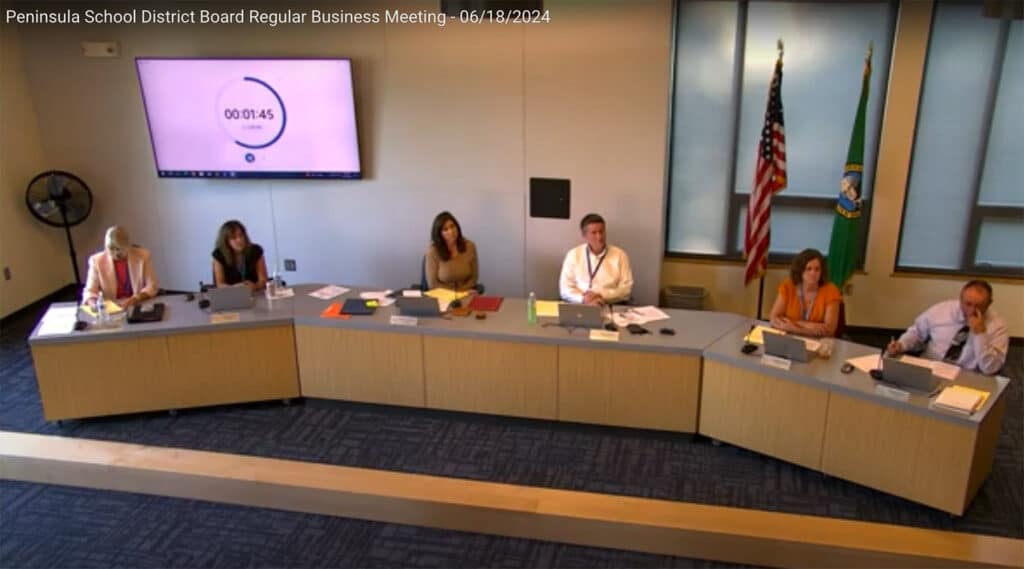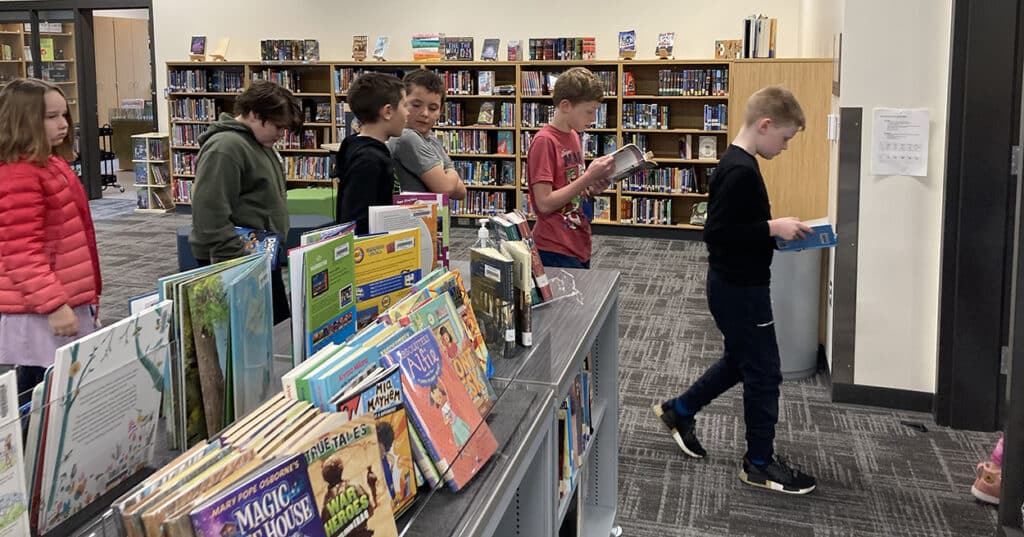Community Education
Wit & Wisdom, being piloted in Peninsula elementary schools, criticized by some parents
Peninsula School District is updating its K-5 English Language Arts curriculum and will pilot two options starting this fall. The proposed curricula will get a test drive in selected classrooms in all 10 district elementary schools.
People speaking before the Peninsula School Board this summer strongly criticized one of the curricula in the K-5 pilot, Wit & Wisdom. They say many of the books used in the program are not age-appropriate and are potentially distressing to young readers.
Parents of children who are part of the pilot will be notified in a letter from their teachers shortly after school starts. The district will invite families involved in the pilot to share their input at various points during the process.
Curriculum updates in all grades
School districts conduct curriculum updates on a periodic basis. For this update, Peninsula is retooling its entire K-12 ELA curriculum in light of the district’s extensive study over the past two years.
That study found materials and teaching methods coming up short, especially for students who struggle with learning to read and write. It determined that current curriculum was not fully in line with evidence-based instruction grounded in the “science of reading.”
The district’s goal is “to equip our students with a rigorous ELA curriculum that aligns with (state education) standards and utilizes evidence-based methodologies.” That means teaching foundational language arts skills, like sounding out words, in an explicit and systematic way. Teachers pair foundational skills instruction with complementary reading and writing assignments.
Peninsula is also updating its middle school (grades 6 to 8) curriculum with the first pilot set for this fall and winter. The district recently completed an update of its high school ELA curriculum.
Two K-5 pilot options
Both K-5 pilot curriculum options combine teaching foundational skills with books and other materials meant to engage young readers, according to the district’s website. Wit & Wisdom includes “authentic, complex, information-rich texts,” according to its nonprofit parent company Great Minds.
In ELA curriculum option one, Wit & Wisdom will be paired with Really Great Reading, a curriculum that teaches foundational skills. Option two is Core Knowledge Language Arts (CKLA), a curriculum that includes both foundational skills and a literature component.
Wit & Wisdom breaks up each grade level into four modules. Each module has its own topic related to history, social studies, science and the arts. Second-grade modules, for example, include A Season of Change (about the seasons), The American West, Civil Rights Heroes and Good Eating.
Great Minds says it selected books and other materials for each module to build knowledge and reflect diversity.
Information on the grade-level modules and accompanying texts is on Great Minds’ website.
Critics sound off
Leading the charge to block Wit & Wisdom from Peninsula schools was Sarah Garriott, who told the school board on June 4 that the curriculum was rigid and overly challenging for students with learning differences. She described materials used in the curriculum as age-inappropriate and traumatizing.

The Peninsula School Board listens to public testimony, largely about Wit & Wisdom curriculum, during their June 18 meeting.
Garriott is listed as the chapter chair of Moms for Liberty’s Pierce County chapter. Moms for Liberty, with hundreds of chapters in 48 states and more than 130,000 members, advocates for parents’ rights in education.
Garriott warned the board Wit & Wisdom was the subject of a 2022 lawsuit in Tennessee, filed by the group Parents’ Choice Tennessee against Williamson County Schools and the county’s board of education. Plaintiffs charged that Wit & Wisdom runs afoul of a Tennessee law limiting how schools address gender identity and race.
Quoting the suit, Garriott said the plaintiffs found Wit & Wisdom “replete with racial discrimination, age-inappropriate material that causes children guilt, anguish and other forms of psychological harm, it discusses the United States as an irredeemably racist country, and is overall hyper-focused on racial indoctrination.”
Books called traumatizing
Within a litany of materials that the Tennessee plaintiffs found objectionable, for example, they called out “Ruby Bridges Goes to School: My True Story” by Ruby Bridges, who at age six was the first Black child to integrate a New Orleans school. The book, part of Wit & Wisdom’s second-grade module Civil Rights Heroes, includes photographs and illustrations depicting white people protesting integration. The suit charges that such materials and the discussions they lead to are divisive and potentially upsetting to both Black and white students.
In other examples from fifth grade modules, the suit claimed a book related to the displacement of Native Americans by the U.S. government in the late 1800s (“Thunder Rolling in the Mountains” by Scott O’Dell and Elizabeth Hall) and a book about the Civil War (“The Boys’ War” by Jim Murphy) were highly traumatizing for their depictions of violence and death.
Following a committee review of materials cited in the Tennessee lawsuit, Williamson County Schools removed one book (“Walk Two Moons” by Sharon Creech) and restricted the instruction of seven others in the Wit & Wisdom curriculum, according to the Williamson Herald.
‘Adult burdens on little shoulders’
Garriott was back at Peninsula school board’s June 18 meeting accompanied by several other people critical of Wit & Wisdom.
Vanessa Burgess, a special education teacher, said the time required to teach Wit & Wisdom would be burdensome and would erode time available for other subjects like math and art. She predicted Wit & Wisdom would cause “behavior issues” among students.
Paul Frederickson, a longtime Gig Harbor resident, lamented the serious topics addressed in Wit & Wisdom. “My concern is we are taking childhood away from our children,” he said “I see an increasing trend to place adult burdens on little shoulders. That should not be. Children need to be able to simply be children.”
Tackling low scores
During the 2022-23 school year, Superintendent Krestin Bahr convened a 100% Reading on Grade Level Task force to research current best practices on reading and writing instruction. In that year only about 65% of Peninsula students in all grades met state language arts standards.
The task force, made up of teachers, administrators and parents of students with dyslexia, concluded after several months of study that the district needed to make a full shift toward the science of reading. The science of reading concept calls for “explicit instruction in phonemic awareness (the ability to focus on and manipulate units of sound in spoken words, like the ‘mmm’ sound in mat), phonics, vocabulary, fluency and comprehension,” according to the Office of the Superintendent of Public Instruction.
The district last spring required training in the science of reading for all K-2 teachers and all elementary reading specialists through the LETRS program (Language Essentials for Teachers of Reading and Spelling), and it launched plans for a district-wide ELA curriculum update.
Learning to read, reading to learn
Current thinking among educators about teaching children to read and write holds that foundational skills like word recognition should be taught concurrently with the study of literature to enhance language comprehension. In decades past, the focus in grades K-2 was on learning to read. In grade three and beyond, it was reading to learn.
“What we now know based on research and evidence is that this learning should happen simultaneously,” said Natalie Boyle, Peninsula’s director of elementary teaching and learning. “When those two elements are skillfully braided together, the result is skilled, accurate, fluent reading with strong comprehension.”
Really Great Reading addresses the learning-to-read component. Wit & Wisdom focuses on the reading-to-learn aspect of language development. The two programs work together, Boyle said.

Peninsula School District is making systemic changes in how students, at least at the elementary level, are taught to read. The goal is for all elementary teachers to receive training in the “science of reading,” which outlines how people learn to read and five essential components for a reading instruction program: phonics, phonemics, fluency, vocabulary and comprehension.
Photo courtesy Peninsula School District
Choosing curricula
Last spring, Boyle led a small team of educators tasked with evaluating a list of potential curricula against extensive checklists of criteria. The team sent a narrowed list of choices to the district’s Elementary ELA Adoption Committee. That committee narrowed the list to Wit & Wisdom and CKLA.
Before making its recommendations, the committee held community listening sessions and surveyed families. Themes that emerged were: support the love of reading, high interest/engaging text, an interest in a variety and diversity of text, inclusion of writing in the instruction, importance of foundational skills and structured literacy.
Timeline to adoption
Students in pilot classrooms will receive instruction with Wit & Wisdom plus Really Great Reading for the first nine weeks of school, and they’ll pilot Core Knowledge Language Arts for the next nine weeks.
Based on students’ and parents’ input, teacher reviews and academic data, the district’s Elementary ELA Adoption Committee will make its recommendation to the school board this spring. The district will host an event where families can preview the selected materials.
Next, the district’s Instructional Materials Committee will review the pilot and recommendation process to make sure it was competed with integrity. Community members will be able to review the selected curriculum and provide feedback before the school board votes on the whether to adopt it in late spring. If the process goes as planned, the district will introduce the newly adopted curriculum in all K-5 classes in the fall of 2025.
If you have concerns
Asked about concerns raised that some Wit & Wisdom materials could be disturbing to students, Boyle said that, in addition to other evaluation materials, the committee used a screening tool to scan for “biased content in instructional materials.”
A curriculum preview website will list books to be read in class.
“Families are welcome to reach out to their child’s classroom teacher to preview books,” Boyle said. “If a family has a concern they can work with the principal and teacher in ensuring that their concerns are addressed.”
